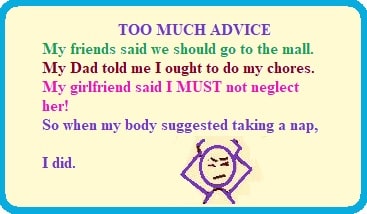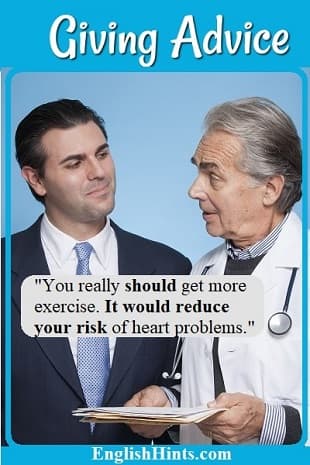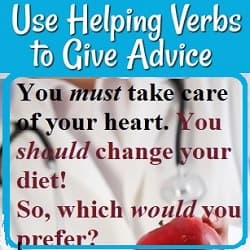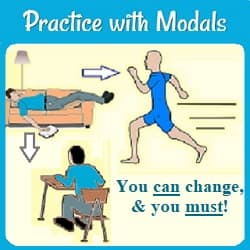Giving Advice
The most common ways of giving advice in English use ‘should,’ ‘could,’ ‘would,’ ‘ought to,’ or ‘must’:
- “You really should see a doctor about that cough.”
- “If you would just get that colonoscopy done, you could stop worrying about colon cancer. You would have a lot better idea what you need to do once you had received the results.”
- “You ought to apologize to Jean right now for going off to lunch without checking the workload.”
- “You know, if you want to get into a good college you must study harder than you’ve been studying.”
It’s also possible to give indirect advice using questions like “Have you considered…?” or “What about…?”
There are many more examples of how to use these and other helping verbs at Using Helping Verbs to Give Advice.
This page suggests some other ways of giving advice and emphasizing what’s important. Then there’s a chance to practice using the expressions on both pages. Complete a practice conversation between a discharge nurse and a patient. (It gives you more examples of common expressions we use to encourage someone to make changes.)
Giving Advice Without Using Helping Verbs
Here are some ways to make suggestions in English. We often use
- ‘need to’,
- ‘had better’ (meaning you need to do it, or else there will be consequences)
- ‘have to’ (similar in meaning to ‘must’),
- ‘recommend',
- ’suggest’ ,
- or imperatives.
Imperatives don’t need a subject. (“You” is implied.) Imperatives give instructions (or orders) to someone under your authority. They're stronger than advice. Friends and family members may also use imperatives to each other as they are clear and fast.
- “Clean your room before Dad gets home!” (You could also say “You’d* better clean your room before Dad gets home!”)
- “Please give out these meds and then check on Mrs. Anderson in room 15.”
- “Take these pills after breakfast every day for the next two weeks.”
- “You need to finish the bottle even if you feel better, so the infection doesn’t come back.”
- “If you want to get better, you have to follow these instructions very carefully.
- "What do you recommend for Mr. Smith?"
- "I’d* usually recommend surgery, but I think we need to wait until he recovers from this hospitalization. So I’d* suggest a consultation with a cardiac surgeon in two months.”
(* ‘You’d better’ is a contraction for ‘you had better.’ ‘I’d’ can be a contraction for either ‘I had’ or more often ‘I would,’ depending on the context. He'd, she'd, you'd, we'd, and they'd can also be contractions for 'had' or more often 'would.' )
Emphasizing Important Advice
‘Must’ is an emphatic helping verb. (Don't use it for suggestions that aren't important!) Other ways to underline the importance of your advice include starting:
- “Be sure to…”
- “Make sure you check…”
- “Be careful to watch for…”
- It’s essential to…”
- It’s important to…”
“Mr. Rodriguez, this medicine could damage your stomach. It’s essential to take it with food. If you start to feel stomach pain, be sure to call our office right away.”
or “Mr. Rodriguez, this medicine can cause stomach ulcers. You must always eat before you take it. It’s important to let us know right away if you begin to have stomach problems.”
Helping Verb Practice: Giving Advice

Choose the correct helping verbs to complete this conversation.
(Several have more than one possible answer, and you will need to use some more than once.)
can, could, do, have, must, ought to, should, will, would
Related Pages & Practice
Lots of examples using helping verbs to give advice, including indirect advice & warnings.
How to form questions in English: a simple explanation with lots of examples using question words and helping verbs.
Practice with modals: can, could, will, would, should, must, & their negatives. Using modal verbs correctly will increase your English fluency and avoid confusion.
All three pages above include examples of questions and conversations used in healthcare settings.
Home> Grammar Practice> Using Helping Verbs to Give Advice.
Didn't find what you
needed? Explain what you want in the search box below.
(For example, cognates, past tense practice, or 'get along with.') Click to see the related pages on EnglishHints.
| site search by freefind | advanced |









